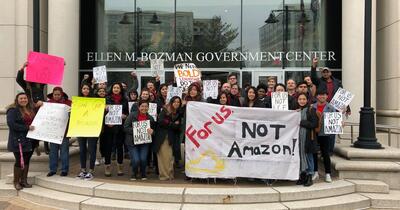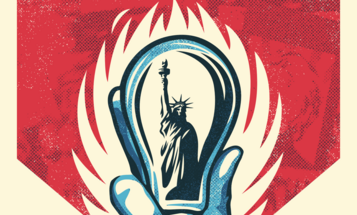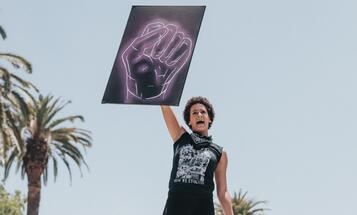
Heed Us: Community Organizing Works – Even Against Amazon
How Northern Virginia activists and community members are organizing to prevent one of the biggest corporations in the world from taking over the civic, social, and political life of Northern Virginia and beyond.

Heed Us is a column series (previously known as Hear Us) that features experts of color and their insights on issues related to the economy and racial justice. Follow us here and at #HeedUs4Justice.
When Amazon announced the 2017-18 search for its second headquarters, known as HQ2, 238 cities entered a bidding war. The company promised the winning location up to 50,000 jobs, and billions of dollars in infrastructure investments. Applicants battled to see who could offer the most enticing package of tax breaks and public subsidies – funding that should be used to meet local communities’ needs. The “winner” was ultimately Arlington, Virginia, after Arlington’s County Board, the five-member governing body in the city, offered Amazon a $23 million subsidy package, in addition to the $750 million promised by the state, with no guarantees ensuring its workers be paid fair wages, or any other community benefits in exchange.
For residents and community organizers in Northern Virginia, however, this was no win at all. Amazon is known as an e-commerce giant, but it is also a major player in logistics, warehousing, digital surveillance through its Ring video surveillance infrastructure, and cloud computing through the increasingly profitable Amazon Web Services. Its sprawling presence allows Amazon to insidiously infiltrate multiple aspects of our daily lives. As Maha Hilal, Co-Director of the Muslims for Justice Collective and a member of the For Us, Not Amazon coalition (FUNA) put it, “There’s probably not a day that goes by that I don’t see an Amazon truck driving somewhere. Everywhere you go, there’s Amazon.”
This dominance comes at the expense of the well-being of its workers and of communities. Amazon’s exploitation of its workers is well documented: Employees work long hours under grueling conditions for low pay. Some die on the job. Its warehouses and cloud computing centers also cause extensive environmental damage.
But communities can and are organizing to fight back against the behemoth. Demos’ latest case study, a series focused on community campaigns working across the U.S. to reclaim power over economic resources, highlights the David versus Goliath battle of a working-class coalition of Black and Brown residents against Amazon. Their experience offers lessons for similar cities in turning challenges into opportunities, connecting local struggles to national movements and curbing corporate power –even when the media and local government won’t.
Amazon’s Arrival Drives Inequality
While Amazon and local politicians promised economic development in the form of jobs and tax revenue from the company, Arlington activists knew this really meant skyrocketing rents and displacing Black and brown communities through gentrification.
Almost immediately after Arlington announced its bid, For Us Not Amazon (FUNA), a women of color-led coalition of workers, activists and residents, mobilized to prevent Amazon from coming to Arlington. FUNA grew out of organizing efforts from PowerSwitch Action, a national organization dedicated to reshaping the economy and urban environment for workers and communities. In Northern Virginia and in other prospective HQ2 cities, PowerSwitch helped convene local groups and coordinate messages, demands and protests pressuring cities to withdraw their plans for HQ2. FUNA also built connections to national anti-Amazon organizing as a founding member of Athena, a coalition of national and local organizations working to stop Amazon’s growth.
Transforming Loss Into Opportunity: Mobilizing to push back against Amazon
From the beginning, FUNA knew the subsidies the Arlington County Board offered Amazon – one of the wealthiest corporations in the world – were outrageous and unprecedented. Even board members like Katie Cristol, who supported HQ2, expressed disappointment in the size and scope of the giveaways to the company, and “the missed opportunity” to support “working people” and “disrupt Northern Virginia’s exploitative construction market for the better.” She neglected to mention that those working people had very little opportunity for community engagement, for residents to comment on the subsidies in the first place. As Hilal, a FUNA member, explained, “A lot of the benefits that Amazon is deriving from being in the area were done in closed-door meetings that you only find out about after the fact.”
FUNA did the community engagement that their local government wouldn’t, ultimately scoring their first victory: The county agreed to publish information on the HQ2 negotiation process in Spanish, Amharic and Mongolian, and to hold two additional listening sessions with the community.
The subsidies passed, but FUNA quickly regrouped to attack Amazon’s grip on local legislators and prevent Arlington County Police Department (ACPD) from partnering with Ring. When word got out that APCD was in talks for a partnership with Ring, which would have enabled the police department to access all of the city’s Ring camera footage, and potentially share it with Immigration and Customs Enforcement (ICE), FUNA used every tool in their arsenal: direct actions, street shutdowns, media outreach, flyering and speaking at County Board Meetings to highlight the threat of racial profiling and surveillance in the community. Their actions coincided with the nationwide uprising against racist police violence in 2020, which ultimately led to ACPD ending talks with Ring.
FUNA didn’t stop there. They demanded that ACPD publicly pledge not to form a partnership with Ring at any point in the future, and has partnered with national groups to put additional pressure on ACPD to stop partnering with ICE, which uses Ring footage to justify deportations. As organizer Danny Cendejas of La ColectiVA, a FUNA member, said, “We had to push forward with political education to raise awareness of Amazon’s harms around housing, ICE, etc. — issues that were being ignored and overlooked by politicians.” FUNA also fought for union wages for workers building Amazon’s new headquarters. They’ve since partnered with Athena on a broader campaign to ensure neither ACPD nor any other police departments partner with Ring.
Connecting Local Organizing With the National Fight
FUNA’s strength is in the coalition’s flexibility and forward thinking, a cornerstone of which is building a new generation of leaders. They developed the Up Against Amazon Institute, a two-day training program with sessions on topics ranging from understanding Amazon’s effect on housing and workers’ rights to the corrosive impact of Amazon’s monopoly in Northern Virginia. All sessions are publicly available online.
Through their partnerships with Athena and PowerSwitch Action, the training also included speakers and information from organizations around the country. As Hilal said of the first iteration, “I really do see the Amazon Institute as a major win and getting folks on board with that as a real opportunity, not just to spread this message, but also to learn to build these skills and this awareness, and then be able to transfer that and take that out into their own work.”
FUNA explained that their mission was not only about fighting Amazon, but also expanding affordable housing and investing in the health, education, and economic futures of Black and brown community members. The coalition continues to call on Amazon to pay its fair share of local taxes, forgo the subsidies (especially in light of public budget shortfalls and extraordinary corporate profits during the pandemic), and indefinitely refuse to partner with local police on surveillance.
In recent months Amazon has been facing increased scrutiny for its abuses against working people. The New York Times has done extensive investigative reporting on Amazon’s physical, mental and financial workplace abuses. There have been calls for the Securities and Exchange Commission to investigate Amazon warehouse injuries—which have occurred at rates more than double the national average since 2017. However, this is not the only way Amazon threatens our local communities. It’s critical in the fight against concentrated corporate power and racial inequities that we also push back against Amazon’s unchecked growth and contributions to gentrification and displacement.
While FUNA was unable to stop Amazon’s plans to establish its second headquarters in Northern Virginia, the coalition successfully pivoted, pushing the Arlington County Police Department (ACPD) to end contract talks with Amazon’s Ring technologies, which would have given the ACPD access to every Ring camera in the county. They won greater transparency and accountability from the Arlington County Board. They made sure that if one of the largest and most ubiquitous corporations in the world with a pitiful record on worker and civil rights was going to build in their community, it would do so on the community’s terms. And they haven’t stopped fighting to mitigate the harm that Amazon poses to the community.
FUNA is not the only coalition of community organizers successfully pushing back against one of the largest corporations in the world. In April, Amazon workers at the JFK8 Fulfillment Center on Staten Island formed the first U.S. Amazon union. In July, residents, activists, workers and labor unions together prevented Amazon from building a massive air hub at the Newark airport.
As these examples show, when Black and brown community members come together we can shift power, even against one of the most powerful corporations in the world, and in this instance, prioritize community-driven economic development.
This post also appears on Next City's blog as part of its "Heed Us" series.
Read our Challenging the Dominance of Big Tech: For Us, Not Amazon in Arlington, VA case study.




